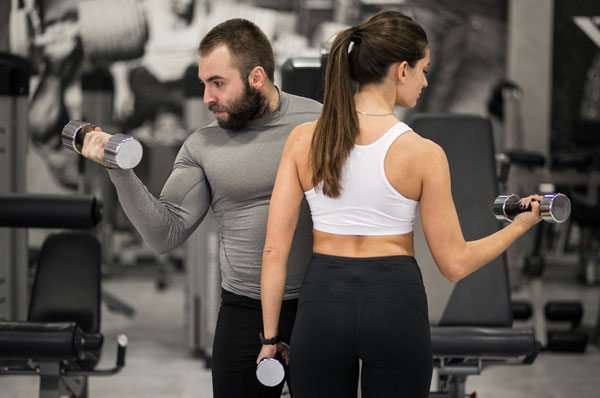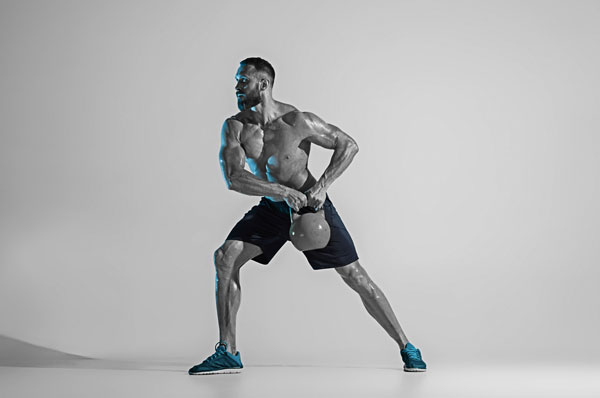Get Fit Here
How does fitness help your body to be productive everyday
Physical exercise stimulates the development of new mitochondria within your cells, meaning that your body will be able to produce more ATP over time. That gives you more energy to exert yourself physically, but it also means more energy for your brain, boosting your mental output.
Ways Exercise Makes You Smarter
If you think muscles are just for meatheads or gym rats think again! Did you know that just 30 minutes of exercise a day can make you a genius? Ok, you still might not become Einstein but you can get pretty close. Check out the 6 ways that working out can make you smarter:
1. Increases Energy
The more you move, the more energized you will feel. Regular physical activity improves your muscle strength and boosts your endurance, giving you the energy, you need to think clearer and come up with new ideas. A good 15 minutes of moving around, even just around your living room, makes your body produce more energy on a cellular level.
2. Sharpens Focus
Dr. John Ratey, author of "Spark - The Revolutionary New Science of Exercise and the Brain" says that exercise improves your brain in the short term by raising your focus for two to three hours afterwards. If you have a presentation or speaking engagement, try to work out beforehand; you'll be at your peak when you have to perform. In the long term, it can even help stave off brain aging and Alzheimer's. This works on the cellular level through neuroplasticity, the ability of the brain to improve itself with blood flow and levels of brain-derived protein. He calls it "miracle-gro" for the brain, and it all comes from regular exercise!
3. Enhances Mood
Exercise releases endorphins, also known as nature's mood elevator, which has been shown to improve memory. Exercise also releases serotonin, which improves mood and alleviates symptoms of depression, according to the Mayo Clinic. Duke University researchers proved that depressed adults who exercised regularly improved as much as those treated with the antidepressant Zoloft!
4. Helps Impulse Control
Exercise helps trigger endorphins, which improve the prioritizing functions of the brain. After exercise, your ability to sort out priorities improves, allowing you to block out distractions and better concentrate on the task at hand.
5. Improves Memory
Your brain remembers more when your body is active. In an experiment published in the journal of the American College of Sports Medicine, students were asked to memorize a string of letters, and were then allowed to run, lift weights, or sit quietly. The students who ran were quicker and more accurate when they were tested than students who chose the other two options.
6. Increases Productivity
Ever heard of "if you want something done, give it to a busy person?" It's a proven fact that productivity begets more productivity. When we're productive and efficient it propels us to succeed more. After exercising in the middle of the work day, workers are more likely to be kinder to their co-workers, increase their work performance and improve their time management. All these amount to a more productive day - all from a few minutes of exercise!
So what I'm saying is you don't have to be a football star or a gold-medal gymnast. You just have to get your heart rate up for half an hour most days. We can all aim for that!
How Does Exercise Improve Work Productivity?
If you exercise regularly, you understand there are many more benefits other than just weight loss or staying in shape. Exercise and workplace productivity go hand in hand. Being productive and alert at work can help you get your job done faster and even make you more eligible for a promotion.
?If you don't exercise regularly, you could be putting your health ? and your job ? at risk.
Alertness and Energy
One way that exercise can help boost productivity at work is through alertness. When you exercise, you are also increasing blood flow to the brain, which can help sharpen your awareness and make you more ready to tackle your next big project. A protein called BDNF (brain-derived neurotrophic factor) boosts your cognitive abilities; and BDNF is triggered by exercise according to the American Council on Exercise.
Having more energy means you will feel more awake at work. Being on top of your game will assure that you perform your work correctly and to the best of your ability. If you don't have time to put in a full cardio workout each day, make small changes to meet your daily goals, such as walking during your lunch period or taking the stairs instead of the elevator advises Psychology Today. Take as many opportunities during the day to find small ways to exercise and your work productivity will increase.
Optimum Physical Health
Being in your best physical health will help improve your overall work ability. Not only can exercising help reduce body weight and the risk for certain medical conditions, you also will have improved cardiovascular health, which will give you more stamina to meet the physical demands of your job.This will also reduce your risk of becoming injured on the job and allow you to meet the expectations required for your position. Get at least 30 minutes of exercise daily ? at least five days a week advises the Physical Activity Guidelines for Americans.
Improves Mental Health
One way to be more productive on the job is to have improved mental health. Regular exercise can help curb feelings of anxiety and depression. When you exercise, your brain releases serotonin that helps you feel better and improves your state of mind, making the stresses of work easier to handle. Serotonin is a neurotransmitter in the brain that sends messages to the body to stimulate mood and emotion, according to Harvard Health.
Regular exercise may also help you better deal with stress ? which is common in the workplace. When you are able to deal with stress constructively, it can lead to improved relationships with your co-workers and a more secure future with your employer.
1. Rest and Recover
Exercise stresses your body. That's because working out causes microscopic damage to your muscles, says Oprea, adding that rest is crucial for repairing, growing, and strengthening your guns. When you're feeling burnt out, it's your body's way of begging for a break.
Heed your body's messages. If you feel tired and weak, you can't perform your best, and you're more likely to hurt yourself. Pushing too hard all the time can result in overuse injuries like tendinitis or stress fractures, according to the Mayo Clinic.
So, slow down. Give yourself a day or two to relax or substitute some of your harder workout routines with light, low-impact exercise.
2. Fuel Your Body Properly
Just like a car, if you don't give your body good fuel, it won't run well and will eventually break down, says Oprea. Proper nutrition is key if you want to stay energized and stave off burnout. Eating a clean, well-balanced diet of lean protein, whole grains, fruits and vegetables will help you feel your best and perform at your max potential.
Also, don't forget that hydration goes hand in hand with proper fuel, says Oprea. A half-hour before you hit the gym, drink about eight ounces of water. Then, sip 7 to 10 ounces every 10 to 20 minutes while you work out, according to the American Council on Exercise (ACE).
3. Reward Yourself
Lack of motivation is a common sign of burnout, but a little inspect may be all you need to get excited about exercising again. "Setting small, attainable goals is an awesome way to motivate yourself," says Oprea. That way you have something to strive for and a reason to keep on track. Start simple, like making it your mission to move in some way every single day. Then, think bigger from there.?
HAPPY EXERCISE DAY

































